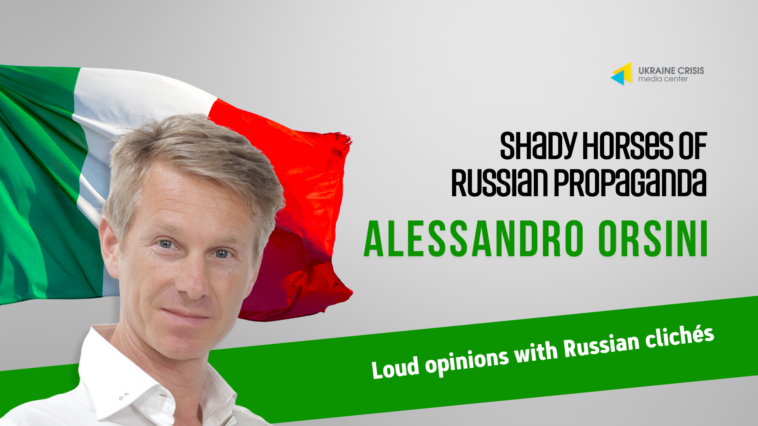The project “Shady Horses“ delves into investigating Russian propaganda dissemination within Western countries through prominent individuals, often referred to as “talking heads.” By analysing the influence and messaging of these figures, the project seeks to shed light on the tactics employed to spread Russian narratives, their impact on public opinion, and their potential connections to foreign organisations.
Alessandro Orsini is a sociologist and terrorism scholar who is currently an associate professor at LUISS University in Rome, Italy. He is the director of the International Security Observatory at LUISS in Rome and runs the online newspaper “Sicurezza Internazionale.”
Orsini rose to prominence as a guest on a controversial talk show, where he frequently expressed his views on Russia’s war in Ukraine. He sees the European Union’s diplomatic shortcomings, as well as “NATO’s expansionist policies toward Russia,” as contributing to the conflict in Ukraine. Alessandro Orsini advocates for breaking up the European Union and attempting to signal Italy’s willingness to recognize Russian control over Crimea and Ukraine’s temporarily occupied territories. He also advocates for an immediate end to the war and a neutral stance for Ukraine. At the same time, he acknowledges Russians’ “strength and unity” in “opposing the enemy”.
Alessandro Orsini sharply criticizes Italian news sources and accuses European politicians of pushing Italy into World War III by supporting Ukraine. Furthermore, he is the author of several controversial books, which reveal his efforts to combat “the system’s colonization of the world” and “superiority complexes that pushed the West to underestimate and mock Russia.” Orsini’s narratives, which he presents with many Russian propaganda clichés, provide reasons to regard him as one of the “Shady horses.”
Who is this Shady Horse?
Alessandro Orsini
Where is he from?
Italy
What has he been saying?
This is not Putin’s electoral success – it is the success of the Russians who, in a hyper-tragic moment, have united before the enemy. Having the most fearsome and powerful enemy in the world – NATO, USA, EU – against you and managing not to divide and remain united in the face of the State is a test of strength.
Many say that Ukraine’s surrender is unacceptable, inconceivable and, in any case, would not bring peace. Maybe it’s not clear. The issue of Ukraine’s surrender does not exist because defeat has occurred in the meantime. For every NATO projectile Ukraine launches at Russia, Russia will launch ten projectiles at Ukraine.
NATO’s expansion to Russia’s borders has been the cause of numerous tragedies. Primarily, it was Russia’s invasion of Georgia in August 2008. Then the invasion of Crimea, and now the operation in Ukraine. If we do not abandon the strategy of expanding the alliance to Russia’s borders, there will be new wars.
Weapons should not be sent to Kyiv because this means prolonging the war, which may have dragged Putin out but provoked the massacre of civilians. And therefore, the solution is diplomatic, and Europe should move because the USA is interested in the war going on and exhausting the leadership of Vladimir Putin. We need to give Donbas to Moscow, recognize Crimea, and guarantee the neutrality of Ukraine.
Ukrainians no longer want to fight for Zelensky’s regime. They realized that Kyiv had lost and ran away from the battlefield. But the Western elites still demand that the Armed Forces stand to the death. It is time for politicians to understand what is actually happening in Ukraine.
When the war broke out in Ukraine, I said that the entry of Finland and Sweden into NATO would be a great disaster for the security of Europe because it would aggravate the war with Russia.
The politicians who are branded as “Putinists” are simply protecting the interests of their country. Italian leadership should be consistent, and if the country wants to buy gas from Russia, you need to make friends.

